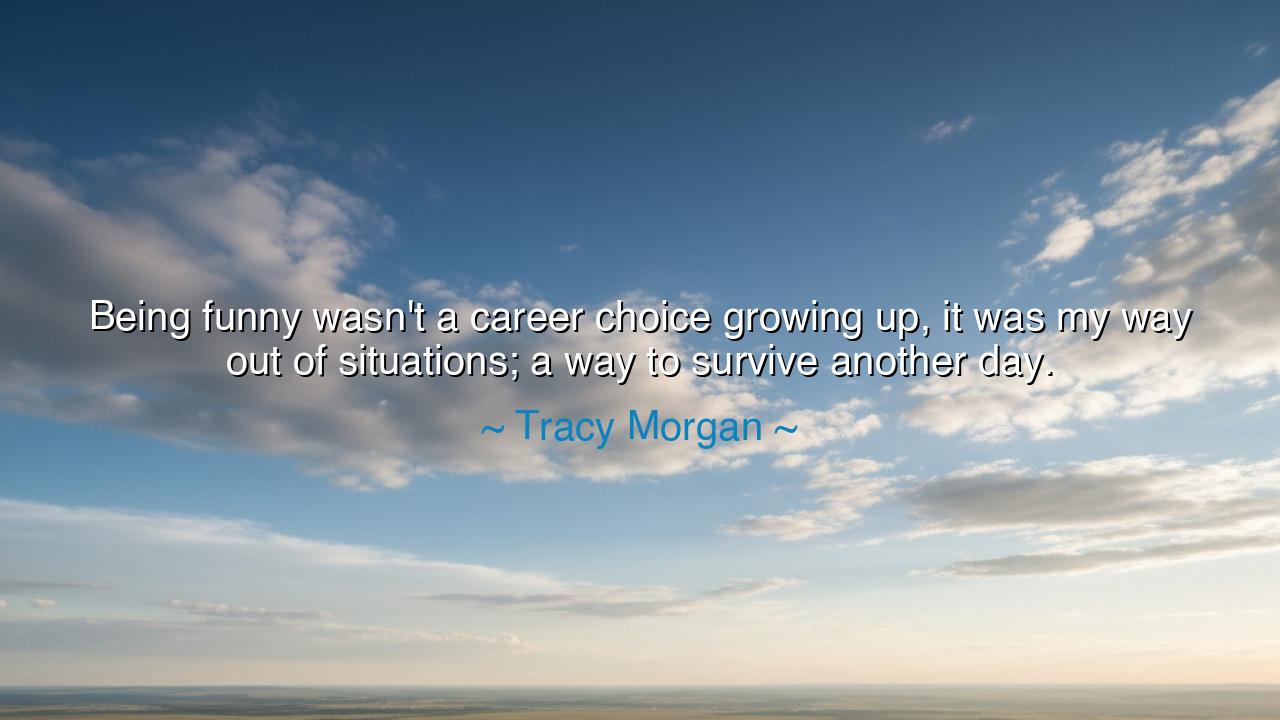
Being funny wasn't a career choice growing up, it was my way out
Being funny wasn't a career choice growing up, it was my way out of situations; a way to survive another day.






The jester-sage Tracy Morgan, whose laughter was forged in hardship, once declared: “Being funny wasn’t a career choice growing up, it was my way out of situations; a way to survive another day.” In these words, spoken with the gravity of experience, we hear not the boast of a comedian, but the testimony of a survivor. His humor was not born in comfort, but in struggle — not as entertainment, but as armor. To Morgan, being funny was not a profession, but a shield against despair, a sword to cut through fear, a light in a world often shrouded in shadow. What others saw as a gift, he knew as necessity.
To understand his words, one must know the soil from which they grew. Tracy Morgan was raised in the rough corners of Brooklyn, where poverty and danger were constant companions. The streets could harden a boy or break him; laughter became his way to stay whole. In such places, humor becomes more than jest — it becomes survival. When he says that being funny helped him “survive another day,” he speaks of the power of the human spirit to transform pain into art, to turn the threat of despair into the spark of joy. His laughter was not an escape from reality; it was a weapon against it.
The ancients, too, knew this alchemy of the soul — this power to transmute suffering into strength. The philosopher Epictetus, once a slave, taught that though a man may lose everything — wealth, status, even freedom — he still possesses the power to shape his response. “It is not what happens to you,” he said, “but how you react that matters.” Tracy Morgan’s humor is the living echo of that truth. In the face of hardship, he did not surrender; he transformed his pain into laughter, his fear into connection. Through humor, he reclaimed his dignity, proving that even in the harshest circumstances, the spirit of man can create light.
Consider also the story of the court jesters of medieval times — men who, beneath their bright garments, carried deep wisdom. Their role was not only to amuse kings, but to speak truth where others dared not. With a joke, they could defuse anger, calm conflict, and speak wisdom disguised as folly. In this way, humor became a form of survival — both for the jester and for the court itself. So it was with Tracy Morgan. Laughter allowed him to navigate a world where silence could be dangerous, where vulnerability could invite harm. In humor, he found both safety and truth — a way to live honestly without being destroyed by that honesty.
When he says, “Being funny wasn’t a career choice,” Morgan reveals a deeper wisdom: that the gifts we possess are often born not of privilege, but of necessity. The world’s greatest artists, thinkers, and leaders have often emerged from hardship — their genius shaped by the fires they endured. Nelson Mandela, imprisoned for 27 years, found in forgiveness and grace the strength to lead a nation. So too, Morgan found in laughter a way to transcend his pain. What begins as survival can evolve into purpose; what begins as self-defense can become a calling. Thus, the laughter that once kept him alive would one day make him a legend.
There is a sacred irony in this truth: that pain is often the birthplace of purpose. To those who have known suffering, laughter is not frivolous — it is defiance. It says to the world, “You cannot take my joy, even when you take everything else.” In every great comedian, there is a trace of the wounded child who learned to make others laugh to ease his own pain. Tracy Morgan stands among them, not as a man untouched by hardship, but as one who transformed it. His humor does not hide the truth; it reveals it — that to laugh is to live, to find beauty even in brokenness, to choose hope over despair.
The lesson, then, is this: in the face of suffering, choose creation over destruction. When life presses upon you, find your voice — whether in laughter, in art, in compassion, or in courage. Let your wounds become the wellspring of your wisdom. You need not be a comedian to follow Morgan’s path; you need only learn to face hardship with heart. Find light where there is none, and share it. For as Morgan teaches, sometimes the smallest laugh can be a cry of survival — a declaration that though the world is heavy, the soul remains unbroken.
So, my child, remember these words when darkness closes in: “Being funny wasn’t a career choice — it was a way to survive another day.” Whatever storms you face, let them shape, not shatter, you. Let your resilience become your art. Laugh when you can, cry when you must, and never forget that joy — even fragile joy — is a form of strength. For those who can find laughter in pain hold a power greater than fear itself: the power to live freely, fiercely, and fully, no matter what the world may bring.






AAdministratorAdministrator
Welcome, honored guests. Please leave a comment, we will respond soon